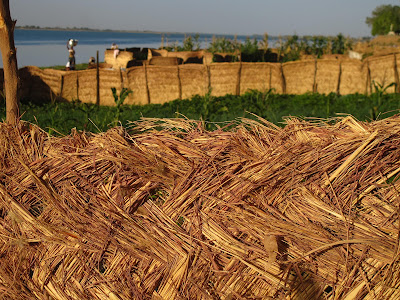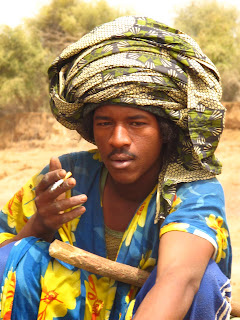“If you are lucky, you may see a human sacrifice.” An
unusual introduction to an area, sure. But then the Dogon people of Eastern
Mali are a pretty unusual bunch. Seeing the colour drain from our pinkish
faces, our guide continued “But don’t worry – it is the sacred fish that
decides who will be killed. And he doesn’t like foreigners.” The ambiguity of
the comment was not lost on us. Nor the fact that a persons well-being may be
left to the whim of a whiskery catfish.
It all began just over a thousand years ago when pygmies
decided that the best way to tone their genetically enormous posteriors was to
scale sheer cliff faces each day just to get in and out of the home. This is
good for both cardio and muscle-toning. The Dogon, on the run from spread of
Islam, found this escarpment and decided that the pygmies there freaked them
out. Rightfully so – they are scary little bastards. Feet like hoofs. The Dogon
chased them out all the way to Cameroon and Uganda where they can still be
found behind the cashiers desks in supermarkets. It has become our mission to
photograph one. So with these strange little creatures out of the picture, the
tenacious Dogon decided to build their villages on the cliff face rather – like every other civilisation in history
– than at the foot of it. There are many theories as to why they did this but
the prevailing one is that they were morons. And there they remained for the
better part of a thousand years before finally coming to their senses and
moving down to flat ground in the twentieth century, lured by the heady prospect
of sleeping on a level gradient.
Their weirdness doesn’t just stop at their choice of real
estate. Their spiritual leader washes with a snake and eats with a tortoise,
their women are banished to a ‘menstruation hut’ for five days over their
periods and the men munch hallucinogenic kola nuts like Smarties. Some of their
practises are admirable – like the emphasis on gender equality, religious
tolerance, conflict resolution and their insistence that all doors have naked
people on them. Other practises are pretty deplorable like female circumcision
and asking every foreigner that passes through for a soccer ball. But most just
sit in the realm of the bizarre – like their elaborate day-long mask dances,
their ability to tell the future based on the footprints of foxes who come to
eat their peanuts (our guide shrugged and stated matter-of-factly “Foxes love
peanuts”) and their advanced knowledge of certain aspects of astronomy. Then,
of course, there’s the small matter of the megalomaniacal catfish and his
rampant bloodlust for human souls. We never fully established if human
sacrifices were, infact, still practised. We never got close enough to a pool
to ask.



















































